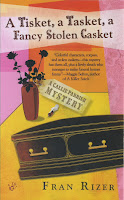
Guest blogger Fran Rizer is the author of A Tisket, a Tasket, a Fancy Stolen Casket. The second Callie Parrish mystery, Hey Diddle, Diddle, the Corpse & the Fiddle will be released by Berkley Prime Crime on March 4, 2008. Her website is www.franrizer.com
Southern literature has been defined as writings about the South, written by authors raised in the South, characterized by importance of family, importance of time and place, and use of southern voice and intellect. I didn’t set out to write the Callie Parrish mysteries to fit this description, but Callie is, in fact, southern. Why?
Write about what you know—I couldn’t count the number of times I’ve heard, read, and taught those words. They’re why the Callie Parrish mysteries take place in the south. I’ve lived in South Carolina my entire life. The laid-back charm of the land and life are as distinctive and apparent as the southern dialect.
Southerners are gracious—A successful mystery writer recommends that protagonists have “unusual occupations.” Callie was a kindergarten teacher, but she grew tired of five-year-olds who wouldn’t be quiet or lie still for their naps. She solved that problem by becoming a mortuary cosmetologist, a job she loves because her clients are silent, don’t jump around, and don’t have to tee tee every five minutes.
I’m surprised how many of Callie’s fans have worked in funeral homes. Until I set out to learn the business, I didn’t even know that in Funeraleze, Callie’s position is called a cosmetician, not a cosmetologist. I learned through the graciousness of Southerners, who, for the most part, are courteous and helpful, especially those super polite undertakers.
The graciousness of my southern relatives is why my family members didn’t freak out when I went missing at funerals and visitations. They’d be looking for me, and finally someone would tell the others, “I saw her go downstairs (or upstairs or to the back) with the mortician. She’s probably asking questions and climbing around the caskets again.”
The kindnesses of people at the School of Mortuary Science less than a hundred miles from my home and the South Carolina Undertakers Association are also very helpful. Caution to non-southerners: Beware of southern graciousness. Sometimes smiles are masks some southerners wear while they call you “Sweetie” as they knife you in the back.
The “Bless her heart” syndrome grants grace—Authors say they like to write southern because it’s okay to say anything bad about a person, so long it’s followed by “Bless her heart.” Example: “That woman is just an evil, conniving bitch. Bless her heart.” The blessing makes everything okay.
I haven’t used that expression yet because Callie defies the stereotype and has a tendency to “call a spade a flippin’ shovel” without adding “bless her heart.”
Southerners are easy to describe—When Callie says her daddy “looks and acts just like a sixty-something-year-old Larry the Cable Guy,” nothing else is needed.
I love the grits and gravy heritage—Southern greats set wonderful precedents. William Faulkner and Thomas Wolfe wrote sentences that ran on over half a page, longer than my paragraphs. Some are about as lengthy as my chapters. (Hyperbole is part of the southern speech pattern.)
They knew about run-on sentences; they simply wrote their stories in the rhythm and flow of the South. I didn’t set out to write “southern.” Callie’s rhythm and flow are her own, and occasionally that means sentence fragments and unusual structures. Being classified as “southern” enables writers to break rules though I can’t say being southern lets me get away with murder. Callie always solves the crime…bless her heart!

